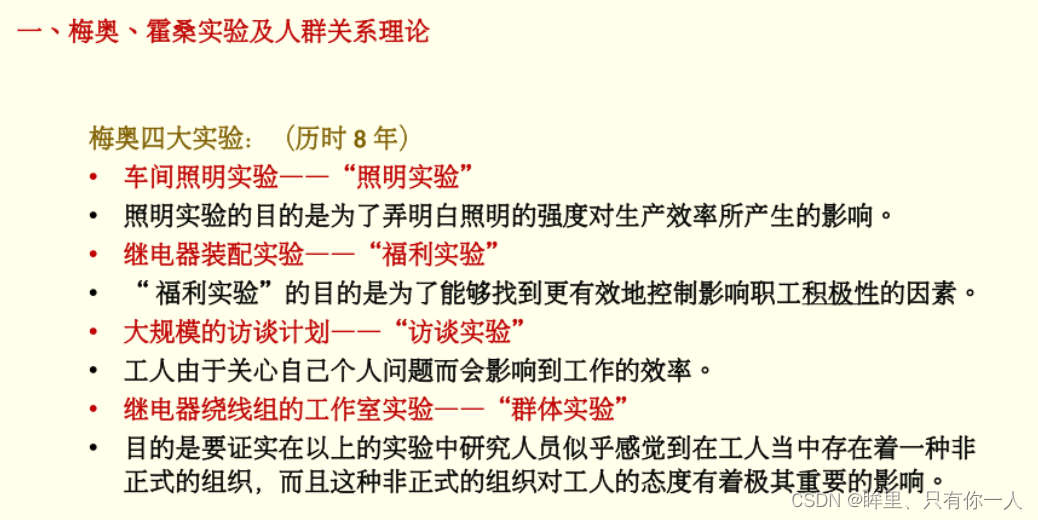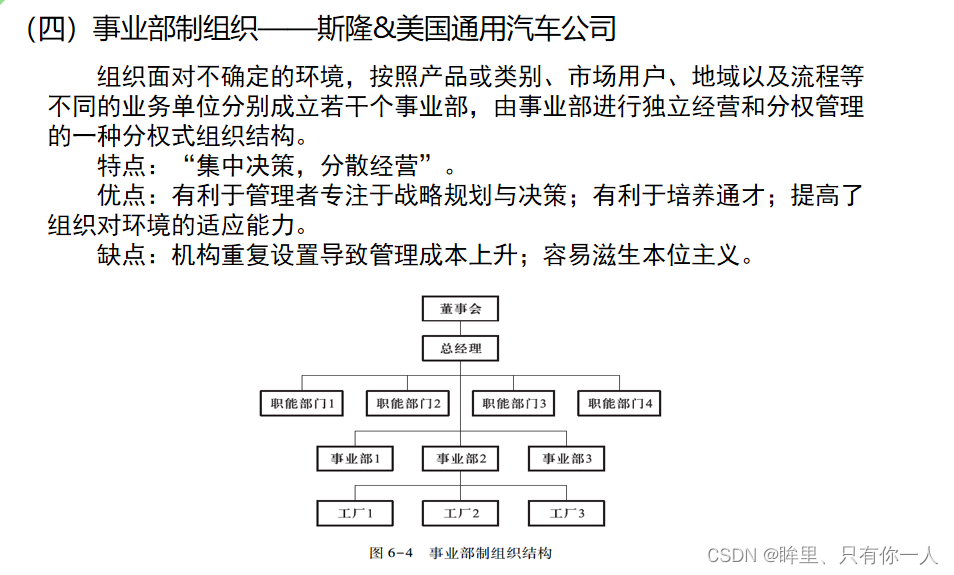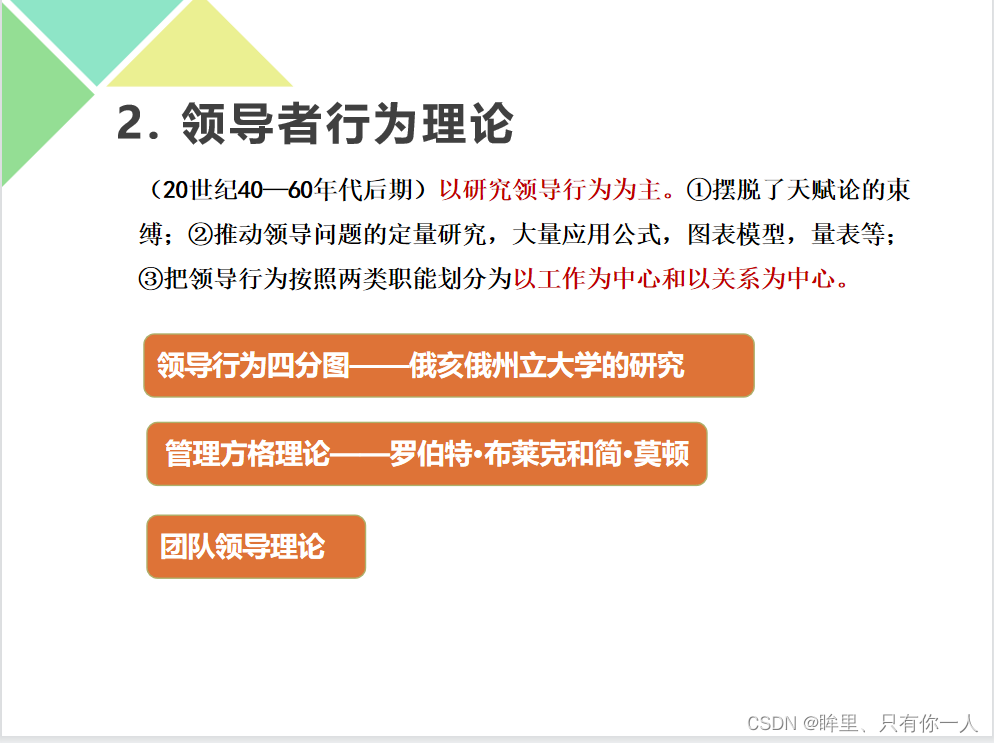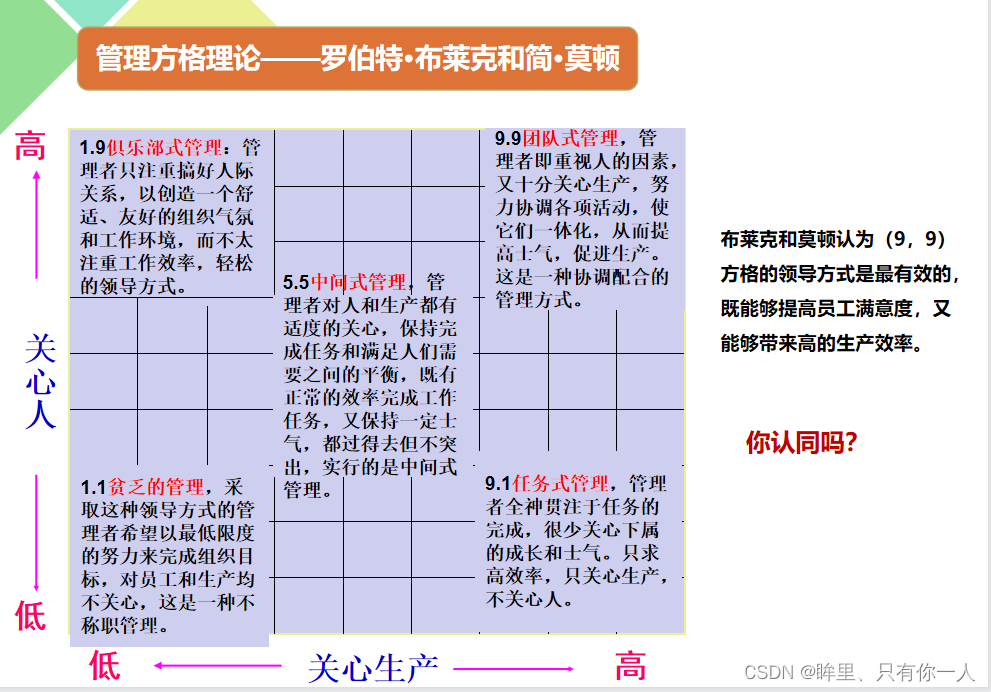当前位置:网站首页>Summary of important knowledge points of management
Summary of important knowledge points of management
2022-07-20 10:54:00 【You are the only one in my eyes】
Summary of important knowledge points of management
- Chapter one Introduction to management
- Chapter two : The historical evolution of management theory
- The third chapter Decision making
- Chapter four organization
- The fifth chapter Leader
- Chapter six control
Chapter one Introduction to management
1.1 The research object of management
The research object of management : It includes both individual activities and group activities , General organizations and enterprise organizations, but mainly industrial and commercial enterprises as the main research object .
1.2 The essence and connotation of management
1.2.1 The connotation of Management
(1) The concept of Management : In order to effectively achieve organizational goals . Managers use relevant knowledge 、 Technology and methods make decisions about organizational activities 、 organization 、 Leader 、 The process of controlling and continuously innovating .
(2) The basic characteristics of management :
1) carrier — organization : interdependence
2) object — resources ( people 、 goods 、 matter 、 Information ), Man is the most important : Management should be based on people Centered
3) The main body — People engaged in management activities ( managers )
4) Job content — Five functions ( Decision making 、 organization 、 Leader 、 control 、 innovation )
5) The core — The process of allocating and coordinating resources
6) Purpose : Effectively achieve the organization's goals ( Achieve goals that individuals cannot achieve )
1.2.2 The essence of management
(1) Management is to manage people or their behaviors
(2) The essence of management is to Human behavior Coordination
Chapter two : The historical evolution of management theory
2.1 Classical management theory
2.1.1 Three important representatives
(1) The father of scientific management : Taylor And its scientific management theory
(2) The father of modern management : fayol And its general management theory
(3) The father of organizational theory : Webber And its bureaucratic organization theory
2.1.2 The characteristics of classical management theory
(1) Research focus : How to improve efficiency
(2) Advocate using Science replaces experience
(3) Management specialization 、 Professionalization
2.2 Behavioral science management
2.2.1 Mayo 、 Hawthorne “ Four experiments ”

2.2.2 Maslow “ Hierarchy theory is needed ”

2.2.3 Herzberg “ Two factors ” theory

The third chapter Decision making
3.1 Decision making and decision theory
3.1.1 The meaning of decision :
(1) The second premise of the decision is to have a clear purpose
(2) Conditions of decision : There are several viable options
(3) The focus of the decision : The analysis and comparison of the scheme are handed over
(4) The final result : choice – A satisfactory plan
(5) The essence of decision : Advocate the new process of universal judgment
3.1.2 Types of decisions
(1) According to the degree of environmental control : Deterministic decision making 、 Risk decision making 、 Uncertain decision making
(2) According to the decision problem : Procedural decisions 、 Non procedural decisions
(3) The subject of the decision : Personal decision making 、 Centralized decision making
3.2 The process of scientific decision
(1) Diagnose problems or identify opportunities (2) Clear objectives (3) Planning
(4) Screening scheme (5) implementation (6) Evaluation effect
3.4 Quantitative decision-making method
3.4.1 Decision making scheme selection criteria under uncertainty
(1) The rule of optimism : Things are always going in the best direction for yourself
(2) Pessimistic criterion : Things always go in the direction of the worst
(3) Equal probability criterion : The probability of various possible results of each feasible scheme is the same
(4) Minimum regret criterion : Decision makers always choose action plans that do not deviate from the best results
3.4.2 Decision tree

3.4.3 The expected value method

3.5 Implementation and adjustment of decision-making
3.5.1 Type of plan
(1) According to the length of time ∶ Long term plan (5 More than a year's plan )、 Short term plan (1 Plans within years 、 Medium term plan ( 1-5 Year plan )
(2) According to the activities involved :
Comprehensive plan ( Activities involving many departments and aspects within the organization , Overall plan )
Professional plan ( An activity plan involving an aspect or some aspect of the organization )— Personnel planning 、 Financial plan 、 Production plan 、 Sales plan
Project plan ( A plan formulated by an organization for a specific topic )— New product development plan 、 A project plan 、 Specific activity plan
(3) According to the plan, the degree and duration of influence on the business scope of the enterprise :
Strategic plan : Plan and tactical plan for the overall objectives and strategic plans of enterprise activities : A plan about how the organizational activities work
Operation plan : Specific action plan of a department or individual
3.5.2 The process of Planning
Set plan goals - Measure the gap between the current situation and the goal - Forecast the future - Make plans - Implement and summarize the plan
3.5.3 Method of Planning – Plan review technology


3.5.4 Process and method of advancing the plan (SMART、PDCA)
(1) Management by objectives
Principles of goal setting :SMART principle : Concrete 、 Measurable 、 It can be realized 、 Related to 、 There is a time limit
(2)PDCA loop
PDCA Respectively represents the plan (plan)、 The implementation of (do)、 Check (check) And improvement (action) Four basic stages
3.5.5 5W1H

Chapter four organization
4.1 Influencing factors and principles of organizational design
4.1.1 Influencing factors of organizational design

4.1.2 Principles of organizational design

4.2 Type of organizational structure





The fifth chapter Leader
5.1 Three elements of leadership

5.2 Leader behavior theory

5.2.1 Leadership behavior quadrant —— Research at Ohio State University

5.2.2 Management grid theory —— Robert · Black and Jane · Morton

5.2.3 Team leadership theory

5.3 Leading and being led
5.3.1 Situational leadership model

5.3.2 Leadership role theory

5.4 incentive
5.4.1 Human nature hypothesis

5.4.2 Basic theory of behavior
5.4.2.1 Hierarchy theory is needed

5.4.2.2 Two factor theory

5.4.3 Incentives

5.5 communicate
5.5.1 Overcome communication barriers

Chapter six control
6.1 The principle of control

6.2 Type of control



边栏推荐
- GC tuning principle of JVM (14)
- Verilog grammar basics HDL bits training 02
- 15day
- Conception d'un compteur de fréquence simple pour la FPGA
- C language Standard formatted input and output
- Modelsim报错“Instantiation of ‘****‘ failed. The design unit was not found.”
- 8day
- 微信小程序应用开发赛作品综合开发记录——晋鹿文旅(云开发——概览)
- FPGA之蜂鸣器播放音乐《花海》
- FPGA buzzer plays the music "sea of flowers"
猜你喜欢
随机推荐
【MySQL数据库】常见知识点总结
selenium基本使用以及使用selenium抓取某网站招聘信息(持续更新中)
炒股开户怎么最方便,网上客户经理开户安全吗
小白程序员第八天
Impala关于ValueTransferGraph一段代码的疑问解答
如何对CDH集群中的Impala打印线程堆栈
函数中的形参实参和返回值
TicTacToe three child Lianzhu game (with source code)
GC tuning principle of JVM (7)
FPGA之实现UART串行异步通信-一字节数据接收
GC tuning principle of JVM (12)
JVM之GC调优原理(七)
关于函数的一些小总结
Verilog grammar basics HDL bits training 02
How can 3dslicer extension modules be added to external expansion packages?
FPGA按键消抖—两种按键消抖形式的对比
FPGA仿真时使用任务及随机函数编写激励测试文件
JS定时器及Swiper插件
20day
8day









